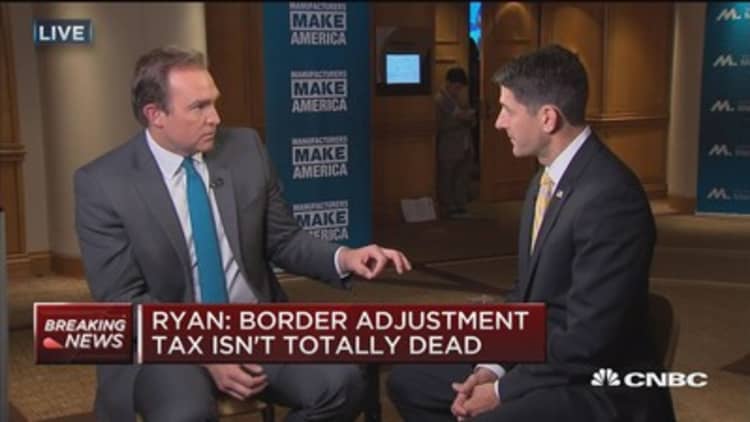
Retailers haven't given up their fight against a border adjustment tax.
While some consider the border tax, or BAT, to be a dead issue, the retail industry isn't prepared to take any chances.
On Wednesday, the National Retail Federation sent a letter to Congress, titled, "Congress Should Focus on Income Tax Reform, Not BAT." NRF said it's urging Congress to reject a proposed tax that would hike prices of imported goods to the U.S., with many retail chains claiming the measure would pass hefty price tags on to consumers.
The border tax, originally devised and backed by House Speaker Paul Ryan, has since divided Republicans in Congress.
Kevin Brady, chief tax writer for the House Ways and Means Committee, said in late May that the tax was a "critical" part of the plan for the GOP. But Treasury Secretary Steven Mnuchin has reportedly told Democrats that he and President Donald Trump do not support BAT in its current state.

"The solution for reducing the corporate tax rate should not be to shift the tax burden to individuals and families through the imposition of a consumption tax," NRF Senior Vice President David French said his letter Wednesday.
"Since the overall purpose of pro-growth tax reform should be to improve the standard of living of the American people, it would be counterproductive to include a consumption tax in that plan."
French said NRF members, which include big names like Amazon and Wal-Mart, would have to raise their prices about 15 percent to "break even" under BAT. NRF estimates show the average family could be forced to pay as much as $1,700 more on items each year, should some sort of BAT be implemented.
This latest move from NRF comes just one day after the trade association hosted Vice President Mike Pence to speak to more than 200 retail representatives from across the country, at the Retail Advocates Summit in Washington.
"As retail goes, so goes America," Pence told the crowd. "This president is going to work with this Congress, this year, and pass the largest tax cuts since the days of Ronald Reagan." The current tax code creates "huge barriers" to creating more retail jobs, he added.
But Pence didn't mention BAT — a definite elephant in the room — during his Tuesday speech. Though, he did suggest Trump is working to cut the corporate tax rate, which currently stands at 35 percent, to 15 percent.
"The retail industry is a strong proponent of income tax reform," NRF's French said Wednesday.
"We believe that income tax reform that lowers the rates and broadens the base can provide economic growth for the economy as a whole and can be good for the American consumer. ... We urge you to reject [BAT] and adopt an income tax reform proposal that does not shift the tax burden to consumers."
Also on Wednesday, the House Ways and Means Committee was scheduled to hold a hearing on how tax reform would impact individuals and families. The hearing is part of a series, following one session last week on how tax reform would affect small businesses across the United States.
Lawmakers that had been working on tax reform were starting to seek alternatives following aggressive lobbying to stop the border tax, U.S. House Ways and Means Committee's Brady said Wednesday in an interview with Reuters.
"To their credit, [retailers] mobilized quickly and aggressively, and yes, it had an impact," Brady told Reuters. According to Reuters, Brady did not declare BAT dead, but he acknowledged being open to other alternatives that would accomplish similar goals.
Speaking to BAT on Wednesday, House Speaker Ryan said, "I understand it's controversial and some people don't like it."
— Reuters contributed to this report.
WATCH: Rep. Brady says border adjustment tax critical



